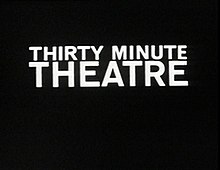| Thirty-Minute Theatre | |
|---|---|
 Opening title[1] | |
| Genre | Drama, Anthology, television plays |
| Written by | Various |
| Directed by | Various |
| Country of origin | United Kingdom |
| Original language | English |
| No. of series | 8 |
| No. of episodes | 291 (241 missing) |
| Production | |
| Producers | Harry Moore, Graeme MacDonald, George Spenton-Foster, Innes Lloyd & others |
| Running time | 30 minutes |
| Production company | BBC |
| Original release | |
| Network | BBC 2 |
| Release | 7 October 1965 – 9 August 1973 |
| Related | |
| Second City Firsts | |
| Infobox instructions (only shown in preview) | |
Thirty-Minute Theatre was a British anthology drama series of short plays shown on BBC Television between 1965 and 1973, which was used in part at least as a training ground for new writers, on account of its short running length, and which therefore attracted many writers who later became well known.[2] It was produced initially by Harry Moore, later by Graeme MacDonald, George Spenton-Foster, Innes Lloyd and others.[3] Thirty-Minute Theatre began on BBC2 in 1965 with an adaptation of the black comedy Parson's Pleasure (author, Roald Dahl). Dennis Potter contributed Emergency – Ward 9 (1966), which he partially recycled in the much later The Singing Detective (1986). In 1967 BBC2 launched the UK's first colour service, with the consequence that Thirty-Minute Theatre became the first drama series in the country to be shown in colour.
As well as single plays, the series showed several linked collections of plays, including a group of four plays by John Mortimer named after areas of London[4][5] in 1972, two three-part Inspector Waugh series starring Clive Swift in the title role, and a trilogy of plays by Jean Benedetti, broadcast in 1969, focusing on infamous historical figures such as Adolf Hitler and Joseph Stalin. Other plays were broadcast by writers like Charlotte and Denis Plimmer (The Chequers Manoeuvre, 1968), David Rudkin (Bypass, 1972, and Atrocity, 1973)[6] and Jack Rosenthal (And for My Next Trick, 1972).[6]
Thirty-Minute Theatre was cancelled in August 1973. Second City Firsts, also of 30 minutes duration, fulfilled much the same role.
- ^ BBC Graphic Design Compilation Reel; see "BBC Motion Graphics Archive". Ravensbourne University London. Retrieved 17 August 2021.
- ^ Re-viewing Television History: Critical Issues in Television Historiography, p.85
- ^ Shubik, Irene (2000). Play for Today - The evolution of television drama (2 ed.). Manchester: Manchester University Press. ISBN 0719056861.
- ^ "Bermondsey (1972)". BFI. Archived from the original on 28 October 2020. Retrieved 24 July 2021.
- ^ "John Mortimer's Britain through the years". The Guardian. 4 May 2009. Retrieved 24 July 2021.
- ^ a b Pebble Mill Studios